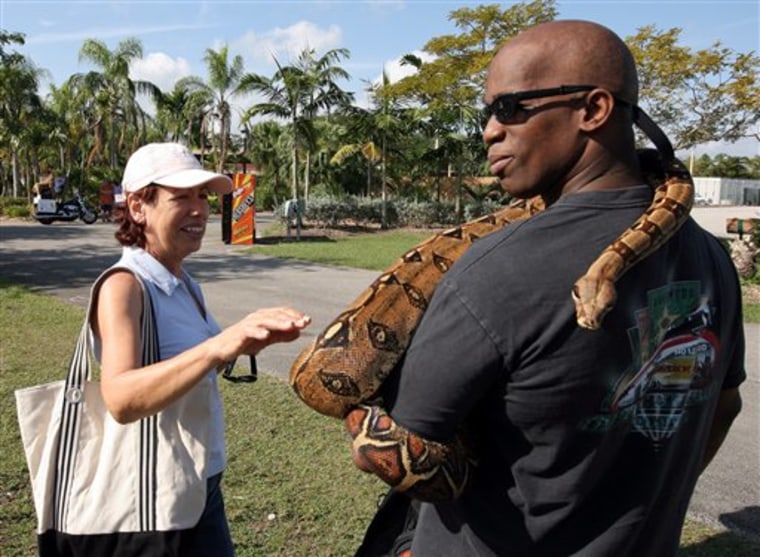With alternately tearful goodbyes and barely contained impatience, more than 100 South Floridians surrendered their exotic animals Saturday at a zoo event designed to give owners an alternative to simply turning them loose.
The canopied plastic tables at the Miami MetroZoo became exhibits of their own as passers-by hoisted children and snapped pictures of the snakes, scorpions and turtles being handed over in laundry baskets, food storage containers and pillow cases.
Of the more than 150 pets handed over on "Exotic Pet Amnesty Day" by people who could no longer care for the beasts, all but six found new homes.
Among the more bizarre submissions were a rhino iguana, a spotted African serval cat and a coatmundi — a racoon-looking mammal found in South America.
"This is garden-variety stuff," said exotic pet veterinarian Thomas Goldsmith, who examined the submissions. "This is Miami. People have sloths and leopards and God knows what else."
Miami resident Ray Padilla, 17, came with seven snakes — Burmese pythons and Colombian boas — each in a pillow case knotted at the opening. He started collecting them as pets when he was 5 and said, simply, "No more room," and, later, "Eh, new hobby."
Tighter regulations
Regulations on owning exotic pets have tightened in the past year and will continue to get stricter, said Scott Hardin, who works in the nonnative species division of the Florida Fish and Wildlife Conservation Commission.
Tighter restrictions usually mean more animals are released into the wild, which can be difficult for domesticated exotic animals and harm others, too. Burmese pythons eat the already rare Key Largo wood rat; parakeets cause power failures because they nest in transformers; and iguanas consume landscape vegetation.
Months before the event, fish and wildlife workers held a drive to register adopters and start what they hope will become a statewide database.
The process was not easy for some of the old owners, though. Debbie Kupferman cried as she left behind her iguana. The Port St. Lucie resident recalled her fear of the pet when her son brought it home from college. He adopted it after some drunken neighbors in his apartment complex threw it off a balcony, then handed it off to her, saying he could not take care of it any more.
More quality time for iguana
She nursed it back to health — it had a bone disease — and has grown quite attached.
"I have three dogs, two cats and I'm getting older," Kupferman said. "Somebody's going to spend more quality time with him," she added, wiping her eyes.
Cooper City resident Christie Lyon — who gave up two lime green Quaker parrots — was also emotional, albeit more turned off from the pet-owning experience.
"People have no idea what they're getting into," said Lyon, who works at a pet store on weekends. Her birds would escape from their cage, so she let them fly loose in her house. But they would ram into glass doors and wreak havoc.
As workers took down information on the parrots, their eating habits and temperaments, Lyon advised them: "Wherever they're going, people should know what they're getting."
